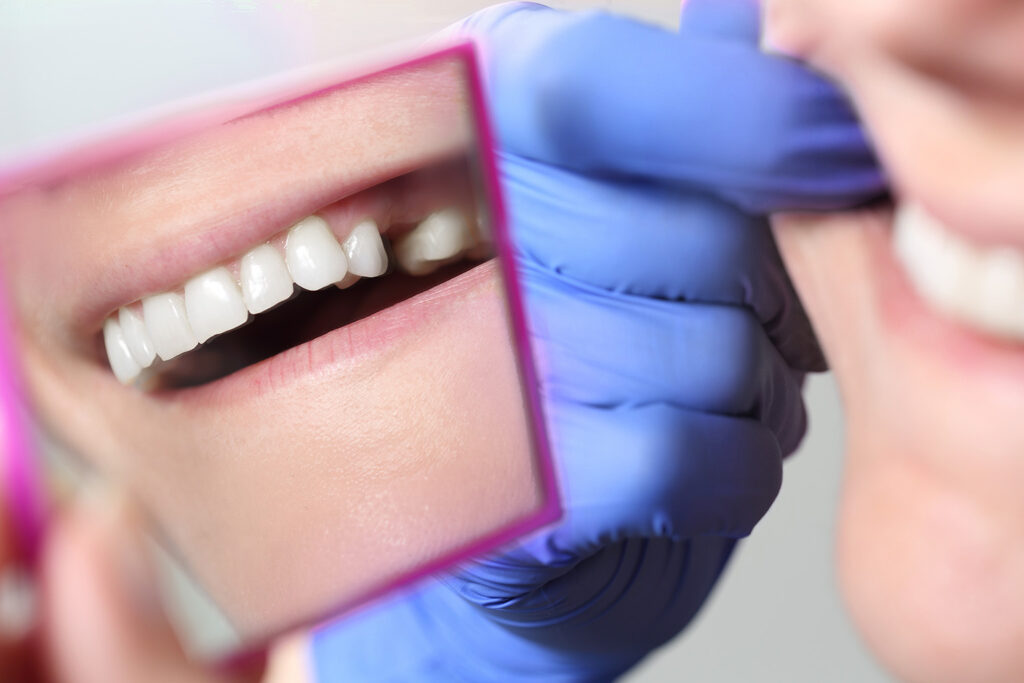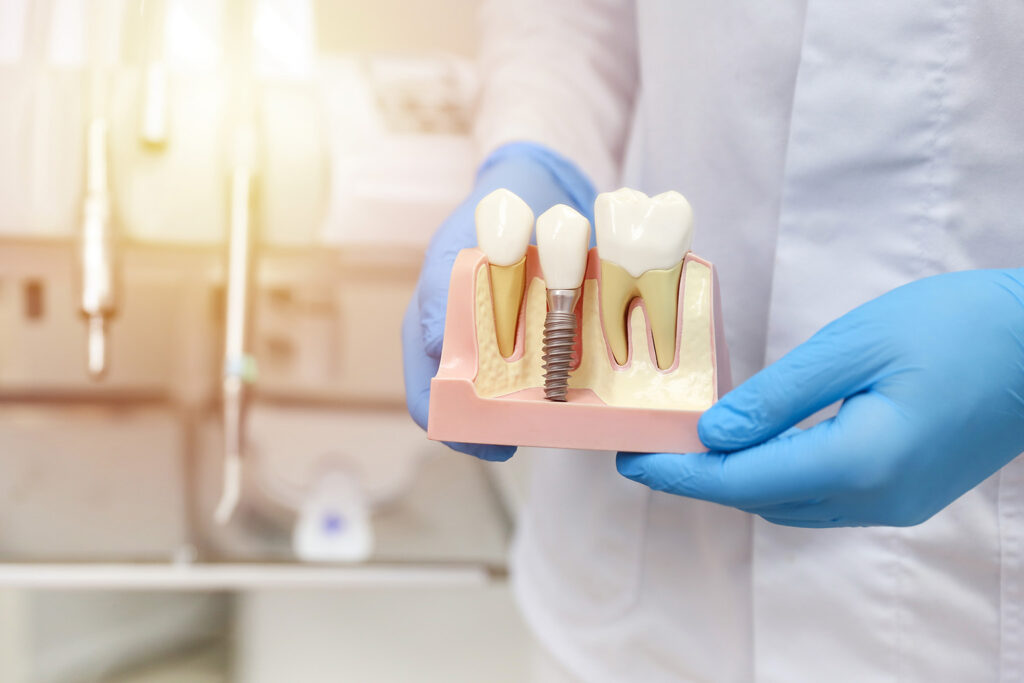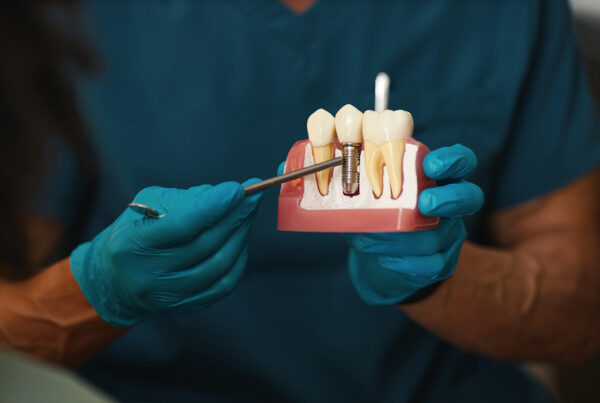Nothing lights up a room like a stunning smile! However, tooth loss can rob anyone of that radiant glow. Fortunately, advances in dental technology like dental implants have made it possible to restore missing teeth and reclaim your perfect smile. Let’s dive into the world of dental implants and see how they can help you achieve the smile of your dreams!
What are Dental Implants?
In essence, dental implants are the next best thing to natural teeth. They’re a long-term solution for missing teeth that provide stability and support to crowns, bridges, and dentures. The process involves placing a small titanium post (the actual implant) into the jawbone. This post serves as an artificial root that the bone grows around in a process called osseointegration. The result? A solid base for an artificial tooth (crown) that looks, feels, and functions just like your natural teeth!
The final result is so life-like that many people forget they even have dental implants. Plus, dental implants are known for their durability. With good oral hygiene and regular check-ups, your new smile can last a lifetime!

Who is a Good Candidate for Dental Implants?
When it comes to dental implants, one size doesn’t fit all. They’re a versatile treatment that can work for a range of patients. Generally speaking, you might be a good candidate for dental implants if you:
- Have one or more missing teeth.
- Have a jawbone that’s reached full growth.
- Have sufficient bone to secure the implants or can have a bone graft.
- Have healthy oral tissues.
- Don’t have health conditions that will affect bone healing.
- Are unable or unwilling to wear dentures.
In a nutshell, the best way to determine if dental implants are the right choice for you is by talking to your dentist. They can help you weigh the pros and cons and make an informed decision based on your specific circumstances.

What is the Success Rate of Dental Implants?
Various research and clinical studies reveal that dental implants have a success rate of around 95-98%. To put it into perspective, this rate is substantially higher than many other dental procedures. The reasons behind such high success rates include the quality of materials used, advanced surgical techniques, and the predictable integration of the titanium implant with the jawbone.
However, it’s essential to bear in mind that the success rate of dental implants can vary depending on a range of factors:
- Individual’s Health: Your overall health can significantly influence the success of your dental implants. Conditions like diabetes or diseases that compromise the immune system can hinder the healing process post-surgery, affecting the success rate of dental implants.
- Oral Hygiene: The way you care for your implants post-procedure has a direct impact on their success. Regular brushing, flossing, and visits to the dentist can go a long way in ensuring the longevity of your implants.
- Location of Implants: The location of the implant in the jaw can also affect the success rate. Dental implants in the lower jaw have slightly higher success rates than those in the upper jaw due to the differences in bone density.
- Proficiency of the Practitioner: The experience and skill of the dental professional performing the procedure have a profound effect on the success rate. An experienced practitioner will be able to strategically plan and execute the procedure, maximizing chances of success.
- Quality of Bone: Your bone quality and quantity also play a crucial role in the success of the implant. Sufficient healthy bone in the jaw is needed to support the implant.
- Lifestyle Factors: Habits such as smoking can drastically lower the success rate of dental implants. Smoking can interfere with healing, and in some cases, it can lead to implant failure.

Popular Types of Dental Implants
Dental implants come in different types, and the choice depends on your specific needs. The two most common types are:
- Endosteal Implants: Often referred to as ‘in the bone’ implants, endosteal implants are indeed the most common type. These implants are typically made from titanium and shaped like small screws. The surgical procedure involves placing the implant directly into the jawbone. As your mouth heals, your jawbone grows and fuses with the implant in a process known as osseointegration. This creates a sturdy, durable base for your new artificial tooth. Once the surrounding tissue heals, which usually takes a few weeks to a few months, a second surgery is carried out. In this procedure, a small connector post, or abutment, is attached to the implant. Finally, a custom-made crown, designed to match your natural teeth, is attached to the post, resulting in a natural-looking, functional tooth.
- Subperiosteal Implants: ‘On the bone’ implants, better known as subperiosteal implants, are an alternative for patients with a shallow jawbone or those who prefer to avoid bone augmentation procedures. These implants consist of a metal frame that is fitted onto the jawbone just below the gum tissue. As the gums heal, the frame becomes fixed to the jawbone. Posts attached to this metal frame protrude through the gums, serving as anchors for the artificial teeth. Over time, the jawbone heals around the frame, securing it in place. This procedure is less invasive and ideal for those who don’t have enough healthy natural bone and cannot or do not want to undergo a bone augmentation procedure.
Choosing between these two types depends largely on your bone health, personal preferences, and professional advice from your dentist. Rest assured, both types of implants offer a sturdy, long-lasting solution to restore your smile and self-confidence.

Conclusion: Reclaim Your Smile with Dental Implants
There you have it – the ins and outs of dental implants! It’s clear to see why they’ve become such a popular solution for tooth loss. They offer an incredible way to reclaim your smile and boost your confidence, all while promoting better oral health.
However, remember that while dental implants are an effective solution, they aren’t a one-size-fits-all answer. The best way to find out if they’re the right choice for you is to schedule a consultation with your dental care provider.
At our clinic, we’re here to help guide you through your dental implant journey. From your first consultation to the final placement, we’ll be with you every step of the way, ensuring you feel comfortable, informed, and excited about your path to a new, stunning smile. Contact us today to schedule your dental implant consultation. Let’s work together to create the perfect smile you’ve always wanted!








